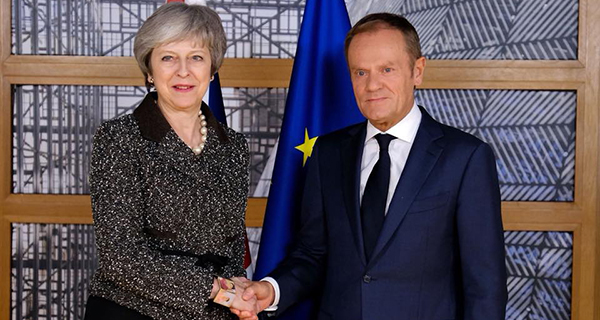
For sheer drama – or maybe that should be melodrama – Brexit’s unfolding twists and turns are hard to beat. If you’d scripted a fictional narrative along these lines, you’d be liable to criticism for one flight of fancy too many.
British Prime Minister Theresa May’s last-minute decision to postpone a parliamentary vote on her European Union withdrawal plan is a humiliating testament to her impotence.
While she tries again to eke out a deal-salvaging concession/clarification from Brussels, the historically minded will see parallels with Neville Chamberlain’s doomed 1930s appeasement efforts and his subsequent political fall.
There are, of course, major differences. The battle over Brexit isn’t the equivalent of the Second World War. Armies aren’t on the march and bombs aren’t falling.
Still, if you take a step back and look at the current situation through the prism of the past, you can see similarities.
Reluctant warriors
Britain’s political leadership in the years immediately preceding the war had no appetite for confronting Adolf Hitler. To men like Chamberlain and Lord Halifax – prime minister and foreign secretary respectively – the idea of another war with Germany was anathema. It wouldn’t be in Britain’s interest and the related destruction would be unconscionable.
Although historical judgment has been unkind to Chamberlain and Halifax, their reluctance shouldn’t cast them as villains. But it’s fair to surmise that their feelings influenced the way they approached negotiations. If your heart isn’t really in something, then you’ll tend to give way, always rationalizing each incremental concession.
And it’s not unreasonable to wonder whether some of the same applies to the current British leadership.
In the 2016 referendum, Theresa May supported Remain, meaning she was opposed to Brexit. The second most powerful figure in her current government – Chancellor of the Exchequer Philip Hammond – was also a Remain supporter.
Indeed, it’s fair to say that Brexit caught Britain’s political class by surprise. The referendum wasn’t supposed to turn out the way it did. Consequently, the political class found itself tasked with implementing something that the majority of its members didn’t really want.
When the key players in the pre-referendum government resigned, people like May could have demurred from stepping forward for the top job, insisting instead that the new government should be led by committed Brexiteers. In other words, Brexit being carried forward by people who genuinely believed in it.
Human nature, however, doesn’t work like that. Presented with a personal advancement opportunity, most people grasp it with both hands, which is how you wind up with reluctant warriors leading the charge.
Failure of the political class
Mervyn King is an economist who served as governor of the Bank of England for 10 years. In a recent column, he lambastes the government’s handling of Brexit, likening it to the appeasement of the 1930s. As he puts it, “the British political class let down the rest of the country.”
King freely acknowledges that the wisdom of Brexit is a matter of opinion on which people can reasonably differ: “There are arguments for remaining in the EU and arguments for leaving. But there is no case whatever for giving up the benefits of remaining without obtaining the benefits of leaving. Yet that is exactly what the government is now proposing.”
One criticism relates to the absence of a Plan B. King characterizes this as “incompetence on a monumental scale.”
Rather than putting all the eggs in one basket and assuming that the only option was whatever deal could be worked out with the EU, King believes that, immediately after the referendum, serious planning should have started for a situation where trade with the EU is conducted under World Trade Organization (WTO) terms. That way, there’d be a worked-through fallback in the event of the EU negotiation failing to produce a satisfactory outcome.
Now, though, the word is that there isn’t enough time. With withdrawal from the EU legally set for March 29, 2019, the argument is that trading on a WTO basis is not just undesirable but also practically impossible.
And King is scathing with respect to the role of the Bank of England, the institution that he led for a decade. To put it bluntly, he believes the bank is wilfully manufacturing doomsday scenarios based on “flimsy and arbitrary assumptions.”
Perhaps King is engaging in the luxury of being an armchair critic. Maybe it’s sour grapes. But if he’s even half-right, it’s a devastating commentary.
Troy Media columnist Pat Murphy casts a history buff’s eye at the goings-on in our world. Never cynical – well, perhaps just a little bit.
The views, opinions and positions expressed by columnists and contributors are the author’s alone. They do not inherently or expressly reflect the views, opinions and/or positions of our publication.


